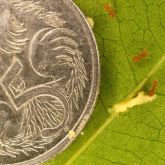Identify and report electric ants
Help eradicate electric ants from Far North Queensland
Book a free annual yard check or report suspected electric ants using 1 of these methods:
- Report online.
- Phone Biosecurity Queensland on 13 25 23.
- Email electricantinfo@dpi.qld.gov.au.
Don't accidentally spread electric ants—use our interactive map to check the location of the electric ant restricted zone, and the movement controls that apply.
Electric ants are category 1 restricted matter under the Biosecurity Act 2014, and all Queenslanders have a general biosecurity obligation to manage biosecurity risks and threats that are under their control, they know about or they are expected to know about.
Electric ants live in soil and most materials that touch soil, including plant and inorganic materials. Moving these materials poses a serious risk of spreading electric ants.
Identifying electric ants
Electric ants:
- are tiny—about 1.5mm long
- are a golden-brown colour
- are usually slow-moving
- are social and are often found in groups
- establish colonies anywhere and have been found
- under stones
- in potted plants, garden waste, mulch, leaf litter, soil and trees
- around swimming pools and water courses
- in wall cavities, clothing, bedding, garden furniture and camping gear
- can be found in wet or dry conditions
- can survive in water and may sting you in your swimming pool.

Electric ant size comparison to 5 cent coin

Electric ant size comparison to eye of a needle

Electric ants are tiny and form slow-moving foraging trails
It's vital that you are able to identify electric ants on your property. For more help with identification:
- view the electric ant photo gallery
- watch a video about the impacts of electric ants
- book a free yard check.
Reporting electric ants
Community participation is vital to the successful control of electric ants.
Although they are not easy to identify because of their small size, search your yard, business premises and community spaces and report any suspected electric ants. We encourage you to do this on a regular basis, as well as booking a free annual yard check.
If you have reported before and had a negative result, don't hesitate to contact us again as electric ants are easily transportable and may have been brought to your property, or an adjoining property, since we last visited.
If you are stung and experience a reaction, seek medical advice first. You should also report the incident to us, mentioning that you have been stung.
Report suspected electric ants using 1 of these methods:
- Report online.
- Phone Biosecurity Queensland on 13 25 23.
- Email electricantinfo@dpi.qld.gov.au.